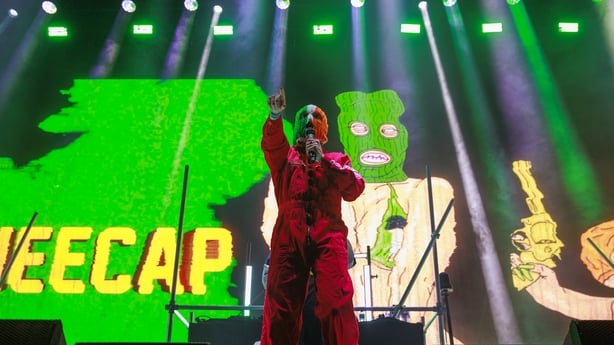It's 2018. I’m in my second year of college, and I’m at home in Ranafast, Co. Donegal for the Easter bank holiday. I’m headed over to Hiúdaí Beag’s in Gweedore for Rónán Mac Aodha Bhuí’s Cabaret Craiceáilte, where a band called Kneecap are performing their first set three months after releasing a single, C.E.A.R.T.A. They play a few unreleased tracks, and finish off with their only published piece of music, prompting myself and the crowd to rush the stage to sing along. The video is shared on Facebook to a few thousand people.
It's 2024, I'm at at the press screening of Kneecap, the Irish-language movie taking film festivals worldwide by storm, with serious award buzz surrounding Móglaí Bap, Mo Chara, and DJ Próvaí. The credits roll, and real life footage from concerts across the past six years start playing, and I am suddenly incredibly nervous that my terrible haircut and dodgy dance moves are going to be broadcast to the world.
If you haven't been paying attention to the Gaeilgeoir scene, the sudden rise of Kneecap to satirical pranksters to one of Ireland’s biggest exports may have surprised you. Being in that pub, however, there was definitely a feeling that the culture had changed. C.E.A.R.T.A. had already been pulled from the airwaves and the band was only a few months away from their raucous first appearance at Electric Picnic, a gig which has become a must-see highlight every year they've performed.
Watch: Kneecap in conversation on The Late Late Show
Rapping as Gaeilge existed long before Kneecap (there'll be no T-Rex O'Saurus erasure in pop culture while I live and breathe), but mainstream success is something that Irish language artists from any genre struggled with pre-pandemic. Early Kneecap shows could turn venues like Belfast's Cultúrlann into something more like New York’s legendary CBGB’s, with high energy performances, riotous crowds, and tense standoffs, with one UCD gig nearly breaking out into an all-out war (I should know, I was there).
For some, Irish is the language of our counterculture. From the initial ban on the language hundreds of years ago, to groups today like An Dream Dearg campaigning for equal language rights, Irish representation is something that has been fought for across generations. The preservation and cultural rejuvenation of the language is something Kneecap has regularly advocated for, running campaigns like Save Our Speech to encourage the use of minority languages.

Which brings us, of course, to the film. While young people across Ireland have felt represented by the band through their music and live performances, Rich Peppiatt's feature-length debut has shown the world the importance of making sure minority languages are preserved and encouraged. Closer to home, Kneecap the motion picture flies in the face of every recent stereotype surrounding the language; the stories are depressing, no one speaks it, and that it has no use outside of the classroom. I’m sure there would be still a few concerned phone calls made to your Irish teacher if they showed you something like this to the first years.
Mí-ádh inniu KNEECAP 💚 #Oscars
— TG4 (@TG4TV) January 23, 2025
Bí cinnte go mbeidh lá eile acu.
Éacht déanta ag gach duine a raibh baint acu leis an scannán. Slua breá báilithe i Maddens i mBeál Feirste le tacú leo inniu. 👏🏼@kneecapceol @grainneog12 @ainemwalsh @richpeppiatt @mbhreathnach pic.twitter.com/CQeLCqRa73
Sure, that Oscar nomination may have proved elusive, but there's still the BAFTAS to come (the film's been nominated for six), plus the IFTAs (17 nominations!), on top of all the awards and plaudits to date, not to mention box-office success at home and abroad. This Irish success story will hopefully encourage even more audiences to take a chance on Irish language media, with exciting new voices already in the wings and ready to capitalize upon the dazzling success the boys have enjoyed to date.
Kneecap is back in cinemas nationwide now. The band play the 3Arena, Dublin on 17th December 2025 - tickets are on sale from Friday 31st January.
The views expressed here are those of the author and do not represent or reflect the views of RTÉ

